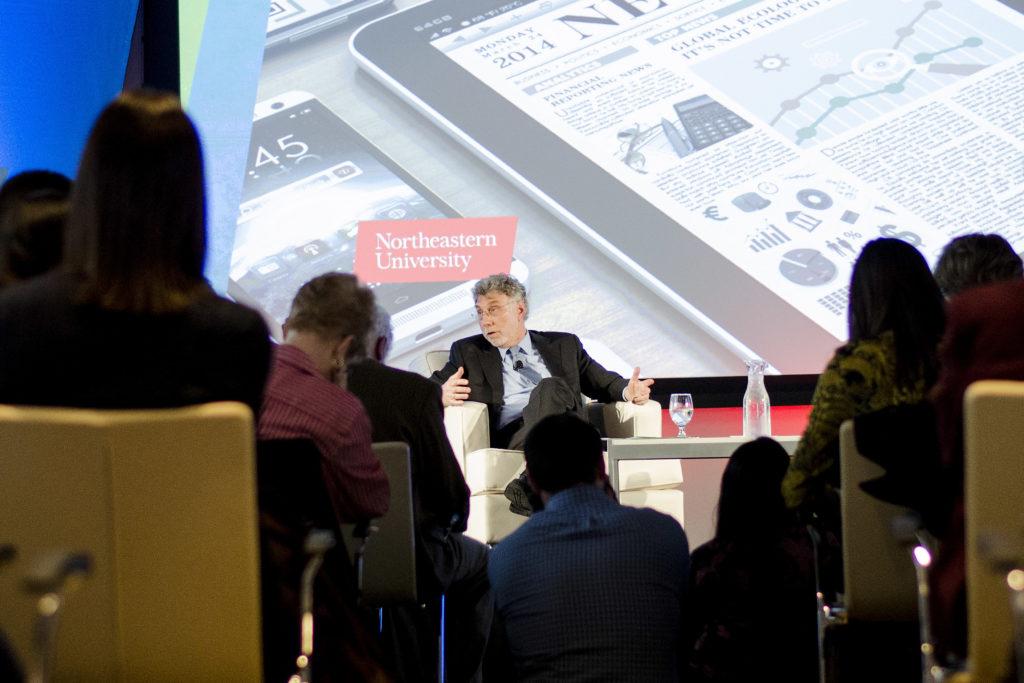By James Duffy, deputy sports editor
Northeastern President Joseph E. Aoun welcomed Pulitzer Prize-winning editor Marty Baron to the East Village penthouse last Thursday, March 31, to discuss the future of media for the third installment of the Presidential Speaker Series.
Baron, currently executive editor of The Washington Post, spent 12 years as editor of The Boston Globe, where he oversaw the Spotlight team’s investigation into the Catholic Church child abuse crisis in 2002.
Baron focused his presentation on how the media industry can adapt to survive in the future and discussed problems that prevent it from doing so.
“[Northeastern] has proven that innovation is possible and can succeed, even in old professions in the oldest fields,” Baron said. “There’s a lesson there for all of us in media.”
To discuss how the media will need to develop, Baron condensed his ideas into six major themes that he believes will dominate the future.
First, he pointed out that today’s society is a mobile one, not simply a digital one, and media outlets must adjust their focus. He stressed that people no longer seek out news – they expect news to find them through social media. Baron continued to place importance on the use of social media to redefine journalism.
“If we wish to know what concerns people the most, we will have to listen better and listen more frequently,” Baron said. “And if you want to listen, go to where people are talking.”
Baron pointed out that the media industry is no longer controlled by the giants of the past, like The Washington Post or The New York Times, because newcomers like BuzzFeed and The Huffington Post have refocused the field and become dominant brands.
His final three points focused on how technology is key to the future of media. Baron believes that media outlets need to be at the forefront of technology to survive, including areas like graphic design.
“When technology advances, the way we communicate with each other inevitably undergoes a revolution,” Baron said. “We can no longer lag behind. We have to be leaders. If we do not lead, we will follow, and if we follow, we will be left behind, and being left behind technologically means failure.”
After outlining how his industry needs to adapt, Baron explained what he believes to be the greatest threat to media: Filter bubbles.
“We are in an era when information consumers have almost unlimited choice,” Baron said. “But in choosing, many have been drawn to media outlets that only reaffirm their preexisting point of view and never challenge it.”
Lincoln McKie, Jr., a Northeastern journalism professor and the director of the editorial lab, was in agreement with Baron about the threats that face modern media.
“I think with all of the technology we have, one big concern is people listening into the echo chamber,” he said. “I couldn’t agree more with him.”
This type of confirmation bias concerned Baron, but what he found more alarming was news outlets that distort facts until they become untrue. He alluded to Clyde Lewis, a talk radio host and conspiracy theorist, as an example of this issue for perpetuating the idea that the Sandy Hook Elementary School shooting was a hoax.
“The first mission of the newspaper is to tell the truth as nearly as the truth can be ascertained,” Baron said, quoting the principles set forth by Eugene Meyer, who bought The Post in 1933. “No matter how murky our future, let’s not forget that we have something meaningful to do.”
After Baron’s speech, he sat down with Aoun for a Q&A, fielding questions from the president and audience members about The Washington Post, Spotlight and social media. The final question came from Aoun, who asked Baron if he would like to teach.
“I don’t know, would I have tenure?” Baron joked.
A cocktail reception followed the event, where students and professors mingled and discussed the future.
“He nailed it,” McKie said. “Both the circumstances for what the future holds and how we ought to go about resolving it, he nailed it.”
Some, like senior international business major Gareth McGrath, were glad that Spotlight played a minimal role in the presentation. McGrath was previously a journalism major who still stays informed on the subject. He said he liked that questions from Aoun and the audience focused less on Baron’s past and more on the future.
“Like [Baron] said, I don’t think anyone knows exactly what the future holds,” McGrath said. “That’s what makes it so exciting.”
Photo by Robert Smith









